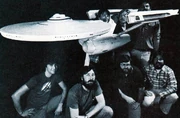No edit summary |
m (lnk.fx.) |
||
| Line 1: | Line 1: | ||
{{realworld}} |
{{realworld}} |
||
[[File:Magicam logo.jpg|right|250px|Magicam]] |
[[File:Magicam logo.jpg|right|250px|Magicam]] |
||
| − | '''Magicam, Inc.''' was a relatively short-lived company specialized in building miniatures that was located on North Las Palmas Avenue in Los Angeles (Hollywood), California. The company, headed amongst by Robert C. King, Joe Matza and vice-president Carey Melcher, was a full subsidiary of [[Paramount Pictures]], who created the company to maintain full control over filming models. Contracted at the start of September 1977, the most notable contributions of the company were the models built for ''[[Star Trek: Phase II]]'' and its follow-up, {{film|1}}, most notably that production's refit-{{USS|Enterprise|NCC-1701}}, initially in close cooperation with Astra Image Corporation, the visual effects shop of [[Robert Abel & Associates]], before the latter was pulled from the project. "''Even though we were a Paramount company, we had to submit bids just like any outsiders. We were expensive, because we're a[n] union shop, but they knew we could do the work.''", Melcher clarified. (''[[Starlog (magazine)|Starlog]]'', issue 27, p. 26) |
+ | '''Magicam, Inc.''' was a relatively short-lived company specialized in building [[studio model|miniatures]] that was located on North Las Palmas Avenue in Los Angeles (Hollywood), California. The company, headed amongst by Robert C. King, Joe Matza and vice-president Carey Melcher, was a full subsidiary of [[Paramount Pictures]], who created the company to maintain full control over filming models. Contracted at the start of September 1977, the most notable contributions of the company were the models built for ''[[Star Trek: Phase II]]'' and its follow-up, {{film|1}}, most notably that production's refit-{{USS|Enterprise|NCC-1701}}, initially in close cooperation with Astra Image Corporation, the visual effects shop of [[Robert Abel & Associates]], before the latter was pulled from the project. "''Even though we were a Paramount company, we had to submit bids just like any outsiders. We were expensive, because we're a[n] union shop, but they knew we could do the work.''", Melcher clarified. (''[[Starlog (magazine)|Starlog]]'', issue 27, p. 26) |
The company was in existence from 13 February 1974 [http://www.corporationwiki.com/New-York/New-York/magicam-inc/41700837.aspx] until 1982, when the shop was closed down and Paramount began using [[Industrial Light & Magic]] for the pre-production of {{film|2}}, though, as of 2010, the company was still listed as one of the subsidiaries of current holding company [[Viacom]]. [http://globaldocuments.morningstar.com/DocumentLibrary/Document/93a4a81bf6ef93022a8e7ea9f0898b3a.msdoc/original/dex211.htm] |
The company was in existence from 13 February 1974 [http://www.corporationwiki.com/New-York/New-York/magicam-inc/41700837.aspx] until 1982, when the shop was closed down and Paramount began using [[Industrial Light & Magic]] for the pre-production of {{film|2}}, though, as of 2010, the company was still listed as one of the subsidiaries of current holding company [[Viacom]]. [http://globaldocuments.morningstar.com/DocumentLibrary/Document/93a4a81bf6ef93022a8e7ea9f0898b3a.msdoc/original/dex211.htm] |
||
Revision as of 11:52, 19 February 2013
Template:Realworld
Magicam, Inc. was a relatively short-lived company specialized in building miniatures that was located on North Las Palmas Avenue in Los Angeles (Hollywood), California. The company, headed amongst by Robert C. King, Joe Matza and vice-president Carey Melcher, was a full subsidiary of Paramount Pictures, who created the company to maintain full control over filming models. Contracted at the start of September 1977, the most notable contributions of the company were the models built for Star Trek: Phase II and its follow-up, Star Trek: The Motion Picture, most notably that production's refit-USS Enterprise, initially in close cooperation with Astra Image Corporation, the visual effects shop of Robert Abel & Associates, before the latter was pulled from the project. "Even though we were a Paramount company, we had to submit bids just like any outsiders. We were expensive, because we're a[n] union shop, but they knew we could do the work.", Melcher clarified. (Starlog, issue 27, p. 26)
The company was in existence from 13 February 1974 [1] until 1982, when the shop was closed down and Paramount began using Industrial Light & Magic for the pre-production of Star Trek II: The Wrath of Khan, though, as of 2010, the company was still listed as one of the subsidiaries of current holding company Viacom. [2]
Prior their involvement with Star Trek, Magicam worked on the effcets for the television shows The Space-Watch Murders and The UFO Incident (both 1975). The only credits of the company after The Motion Picture were the TV shows Cosmos (1980, and that earned the company an Emmy Award) and The Greatest American Hero (1981). Upon closure of the company, several employees moved over to Apogee, Inc., that was also one of companies that worked on the visual effects of The Motion Picture.
Staff

Part of Magicam's modelshop team. From left to right standing, Swansea, Elliot, Gress and sitting, Stetson, Schultz, Simpson and Andy Probert

Busy day at Magicam's workshop. From left to right, Stetson, Simpson, Scott Farrar (visitor), Gress, Gregg, and Bishop in the lower right
Model makers employed at the time of The Motion Picture:
- Larry Albright - Sub-contractor
- Peter Anderson - Consultant
- David Asher
- Bruce Bishop
- Brad Bluth
- Bob Buckner
- Chris Crump
- Jim Dow - Model Shop Supervisor
- Chris Elliot
- Nick Esposet
- Lee Ettelman
- Joe Garlington
- Kriss Gregg
- Ron Gress - Model Painter
- Paul Olsen - Enterprise painter
- Rick Gutierrez
- Dann Linck
- Carey Melcher - Vice President
- Chris Miller
- Tom Pahk
- Richard Raynis
- Chris Ross - Model Maker
- Dennis Schultz
- Russ Simpson
- Dick Singleton
- Mark Stetson - Model Maker
- Zuzana Swansea
- Rick Thompson
- Chris Tietz
- George Trimmer
- Paul Turner
- Steve Wilson
Further reading
- "The Model Makers at Magicam", David Houston, Starlog, issue 27, pp. 26-30
- "The Magicam Miniatures Constructed For Star Trek The Motion Picture", James Dow, American Cinematographer, February 1980, pp. 152-155, 178-179, 186
- Star Trek: Creating the Enterprise, 2012
External link
- Template:IMDb-link

